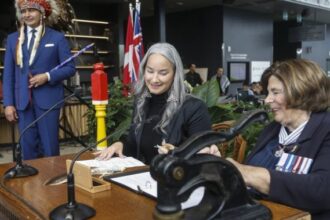In a striking reversal that speaks volumes about the intersection of politics and tragedy, Manitoba’s newly-elected Progressive Conservative leader Heather Stefanson issued a formal apology Thursday for campaign advertisements that criticized the search for Indigenous women’s remains at a landfill site—a controversy that shadowed her party’s recent election defeat.
“I sincerely apologize to the families who were impacted by our campaign ads,” Stefanson said during her first news conference since assuming leadership. “Our intent was never to cause additional grief or trauma to the families of missing and murdered Indigenous women and girls.”
The advertisements, which aired during the October provincial election, questioned the NDP government’s decision to allocate $40 million toward searching the Prairie Green landfill north of Winnipeg. This site is believed to contain the remains of Morgan Harris and Marcedes Myran—two Indigenous women allegedly killed by the same suspect in 2022.
The Progressive Conservative campaign had framed the search as fiscally irresponsible, suggesting the money could be better directed toward other priorities. This position became a lightning rod for criticism from Indigenous leaders, victims’ families, and political opponents who characterized it as callous and dismissive of Indigenous lives.
Premier Wab Kinew, whose NDP government unseated the Tories after seven years in power, made the landfill search a priority immediately upon taking office. His commitment stood in stark contrast to the previous PC government under former premier Heather Stefanson, which had rejected funding the search citing safety concerns and technical feasibility issues.
“We cannot put a price tag on finding our loved ones and bringing them home,” said Cambria Harris, Morgan Harris’s daughter, who has been a vocal advocate for the search efforts. Her emotional appeals throughout the campaign resonated with many Manitobans who viewed the PC position as emblematic of systemic indifference toward Indigenous communities.
The controversy extends beyond Manitoba’s borders, touching on Canada’s broader reckoning with the disproportionate violence faced by Indigenous women and girls—a crisis the National Inquiry into Missing and Murdered Indigenous Women and Girls labeled a “genocide” in 2019.
Political analysts suggest the landfill search issue became a defining moment in the election campaign. “The PC stance on the landfill search crystallized perceptions that the party was out of touch with evolving public sentiment regarding reconciliation,” noted Dr. Emily Thompson, political scientist at the University of Manitoba.
Stefanson’s apology marks her first significant act as party leader following internal elections that installed her as the head of the opposition. The timing of her statement—coming after electoral defeat rather than during the campaign when criticism was mounting—has drawn skepticism from some observers.
Indigenous leaders have cautiously acknowledged the apology while emphasizing that words must be followed by concrete actions. “An apology is a beginning, not an end,” said Grand Chief Cathy Merrick of the Assembly of Manitoba Chiefs. “True reconciliation requires sustained commitment and meaningful support for Indigenous communities.”
Meanwhile, preliminary work on the landfill search has begun under the new government, with technical experts assessing methodologies and safety protocols. The process faces significant challenges due to the time elapsed since the women’s remains were allegedly disposed of at the site and the hazardous conditions present in the landfill.
As Manitoba navigates this painful chapter, questions remain about how Canadian politics can better address the profound inequities facing Indigenous communities. Will this controversy serve as a catalyst for lasting change in how political parties approach Indigenous issues, or will it fade from public consciousness once the immediate political fallout subsides?










